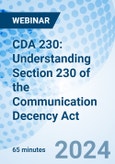Understand Section 230 of the Communication Decency Act, how it operates, and the laws/regulations behind it.
Section 230 of the Communications Decency Act is an extremely powerful internet law intended to free internet platforms and providers from the types of liability often directed at publishers. But it also is one of the most misinterpreted enactments of modern times, misunderstood by internet service providers, internet content providers, legislators, and the public alike. Some see Section 230 as a shield, others see it as a sword. Still, others see it as both a shield and a sword. Now, in the face of much vigorous and heated political and philosophical debate regarding the proliferation on the internet of extremist ideologies, misinformation, allegations of false news, concerns regarding domestic and foreign tampering with United States elections, and anonymity of content providers, it has become a focus-point for potential amendment.
Decisions of the largest Internet Service Providers before, during, and in the aftermath of the 2020 federal elections have heightened scrutiny and conflict regarding the future of Section 230. This topic is designed to help legal practitioners and those who provide, post, or use the internet to understand this important law. Learn valuable tips and best practices to protect yourself and others from the perils of the Internet and to empower Internet companies to control their Internet platforms.
Agenda
What Is CDA 230?
- The Goal: To Free Internet Service Providers and Platforms From the Responsibilities Assigned to Traditional Publishers
- The Text: No Provider or User of an Interactive Computer Service Shall Be Treated as the Publisher or Speaker of Any Information Provided by Another Information Content Provider
- What Does It Cover?
- To Whom Does It Apply?
- Exceptions
Conflicting Interpretations as to What CDA 230 Does (or Should Do)
- Does CDA 230 Require Neutrality as a Predicate for Immunity?
- Does CDA 230 Absolve Internet Platforms of All Responsibility for What Users Post on Their Platforms?
- Can CDA 230 Simultaneously Grant Freedom and Mandate Social Responsibility?
- Threats to CDA 230
Misconceptions Regarding CDA § 230
- Exploring the Exercise of Editorial Functions
- Is Censorship Allowed? Is Censorship Required? Should It Be?
Legal Case Studies
Factual Case Studies (the 2020 Election and Its Aftermath)
Best Practices for Internet Service Providers and Internet Content Providers
Speakers

Mary Ann L. Wymore,
Greensfelder, Hemker & Gale, P.C.- Shareholder in Greensfelder, Hemker & Gale, P.C.
- Certified panel mediator for United States Arbitration & Mediation and various courts
- Practice is focused on all aspects of advertising, media and communications, intellectual property, First Amendment, privacy, and defense of related consumer class actions
- Conducts regular seminars and workshops on issues involving advertising, media, social media, communications, privacy, regulatory compliance, and related matters
- Teaches classes in media law and electronic media law, and including commercial speech
- Member of the California Bar; Missouri Bar (chair, Media Law Committee); ABA Communications Law Forum; Association of National Advertisers; International Trademark Association
- J.D. degree, Southern Methodist University School of Law
- Can be contacted at mlw@greensfelder.com or 314-516-2662
Who Should Attend
This live webinar is primarily designed for attorneys and paralegals. Other legal and purchasing professionals may also benefit from attending.









